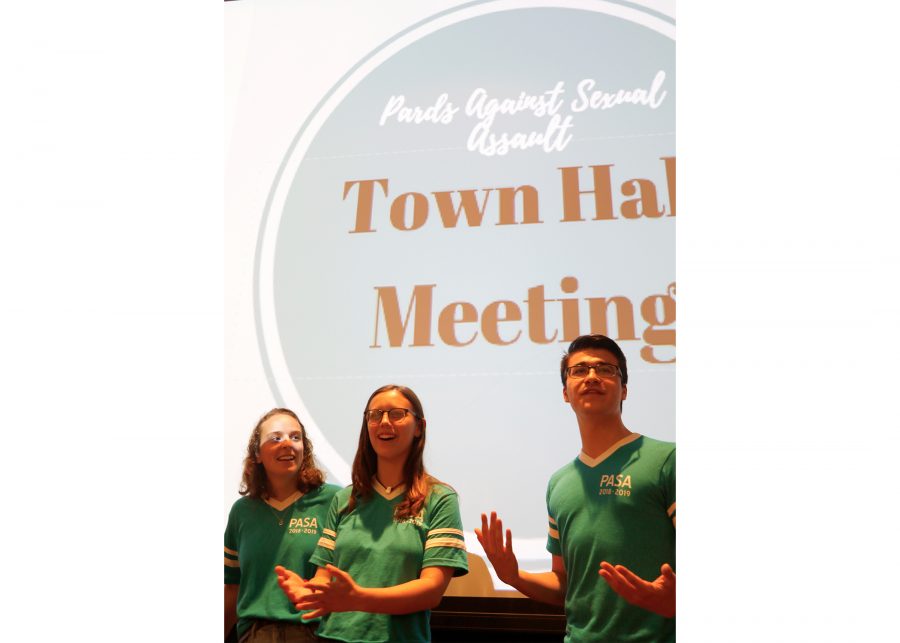Creating effective change in campus culture requires active participation, founder of the ‘me too’ movement Tarana Burke told Lafayette last week. Such involvement was initiated at the PASA town hall meeting, where members from across campus both unpacked Burke’s words of advice and brainstormed ideas for addressing sexual violence at Lafayette.
This Tuesday, Pards Against Sexual Assault (PASA), a student-run peer education group that raises awareness about gender-based violence and sexual assault, led the first of what they hope to be many town hall meetings with the campus community. Tuesday’s meeting was attended by all 11 PASA team members, other students, faculty and administrators to discuss topics ranging from PASA’s mission, to future programming ideas and their most recent event featuring Burke.
PASA encouraged community members and students to unravel Burke’s talk and consider the applicability of the ‘me too’ movement, which works with survivors of sexual violence find pathways to healing, on Lafayette’s campus. The peer leaders stared this discussion by asking how the group might go about engaging different campus-social systems in PASA’s mission.
“We need to seize this moment in history and relate this issue to our own community,” PASA Peer Educator Ella Goodwin ‘21 said.
When asked by PASA members what the ‘me too’ movement meant to them, many students expanded on Burke’s emphasis on community, healing and survivorship. Others considered the roots of the movement and its dissemination through popular media outlets. For many, the ‘me too’ movement and its global reach has little to do with its high profile media coverage. Rather, the movement is centered more so in its ability to empower, foster necessary conversation and make an impact at an individual level and in localized communities.
This media focus reflects the tendency to dismiss perpetrators, rather than deal with the underlying conditions that allow for sexual violence and assault to occur.
“The mainstream for ‘me too’ is to get rid of those people [that have committed assault] but what actually matters is talking about the problems and conditions that allow this issue to exist. This also applies to Lafayette. We don’t want to expel our peers, we want to have a conversation about what is happening underneath,” PASA Peer Educator Reeve Lanigan ‘19 said.
Students also looked more closely in the college’s mission statement, a statement which Burke highlighted in her own talk. Fully embracing the mission statement and understanding how it functions within the campus community and within the administration is something that PASA Peer Educator Lauren Champagne ‘19 said she feels is crucial to the mission’s fulfillment.
“The phrasing of the mission statement is only powerful if we embrace it. Tarana called our community into action and we must do the same,” Champagne said.
Going forward, PASA is working on organizing a number of programming events including workshops and discussions that target different social systems that play out on Lafayette’s campus. The goal is to engage clearly-defined campus units such as Greek life organizations, club and varsity sports teams, involvement clubs and arts & music groups.
In addition to looking into new programming events, PASA is currently planning its second ‘Take Back the Night’ event which will take place on Nov. 8.
Outside of that, the group is investigating other outlets and mediums to broaden its reach on campus. One such idea is to organize a male-facilitated open discussion groups on the topic of masculinity. PASA Peer Educator James Nigro ‘19 said he hopes to spearhead such a discussion that would involve men in the conversation surrounding sexual assault, since men are a demographic he sees as critical to the solution.
Outside the context of the town hall, President Alison Byerly reflected on a question Tarana Burke had posed to the administration during her lecture: “How does your work to prevent sexual violence on this campus reflect [the college’s mission statement]?”
“A couple of us in the administration were talking afterwards about both the programming the administration is developing, but also seeing how [Pards Against Sexual Assault] has been influential in just the year that they’ve been around,” Byerly said in an interview. “We feel like we’ve been supportive of them and given them the funding they’ve requested for their work.”
In terms of work the administration has directly done to combat sexual violence, Byerly said that “the creation of…the Educational Equity Coordinator position…was an important part of our commitment to trying to address these issues in a substantial way,” in addition to reminding students of the programming offered in regard to sexual misconduct. Educational Equity Coordinator Jessica Brown was hired last year, and largely took on the role of former Title IX Coordinator Amy O’Neill.


















































































































